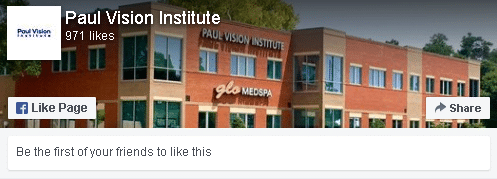When it comes to your eyes, it doesn’t always take very much to affect the quality of your vision and the way you wear your contact lenses. Anything from a slight curve to a small shift in fluid can affect your experience. Specialty contact lenses are made for those who aren’t seeing the desired results from standard contact lenses or who aren’t able to be fitted for them in the first place. Thanks to countless breakthroughs and discoveries in the field, these specialty products can cover a wide range of potential issues.
If you’re looking for an eye doctor in Wilmington, NC that will ensure you get the proper fit from your lenses, Paul Vision Institute wants you to know more about the common types of specialty products and how they can help.
What Do Specialty Lenses Do?
All contact lenses are fitted to match an individual’s eyes. This is why an eyeglass exam won’t readily apply to a prescription for contacts — because glasses hover over and away from the eyes rather than adhering to them like a lens. If you want a new brand of contact lenses, you need to be fitted again to ensure that the brand will conform to your eyes.
However, even though all of our eyes are shaped differently, some are inherently more challenging to find the best fit for. If you’ve been struggling with standard contact lenses in the recent past despite not having any issues before, it may be because your eyes have changed. Specialty contacts may be able to correct the problem, so your routine doesn’t have to change.
What Kinds of Conditions Do Specialty Lenses Treat?
If you’re looking for specialty contact lenses in Wilmington, NC, the Paul Vision Institute works with a number of products that may be right for you.
Learn more about your options for the following conditions:
Keratoconus
Soft contact lenses aren’t necessarily the best option for keratoconus (also known as the most common type of ectasia). This condition affects the cornea, causing it to thin and warp. Lenses that rest directly on the cornea won’t fit properly, making it nearly impossible to get the vision correction you need.
Your eye doctor in Wilmington, NC may prescribe either of the following in the case of keratoconus or a different variety of ectasia:
- RGP: Rigid gas permeable lenses are stable, meaning they’re better at maintaining their shape and position when you blink or rub your eyes.
- Scleral: A scleral lens avoids your cornea entirely, resting only on the whites of your eyes (also known as the sclera).
Pellucid
Pellucid Marginal Degeneration (PMD) shares characteristics of keratoconus, though it’s rarer and affects a different part of the cornea. Your doctor will map the front surface of the eye to understand how your corneal health is progressing and which specialty lenses will serve you best.
Common Specialty Lenses
Specialty lenses range in terms of efficacy and value. At the Paul Vision Institute, our goal is to offer the most effective treatments and stock the best products to protect your vision and eye health.
Hydra-PEG®
Traditional soft contact lenses repel water and attract anything from dust to proteins. Hydra-PEG® is a custom contact lens that’s been coated with a special layer to protect the eyes from harmful deposits. With this treatment, the coating is bonded to the surface of an RPG.
The result is a permanent surface that ‘hides’ the lens from the eye. It’s highly recommended for anyone who suffers from chronic discomfort or dry eyes while wearing contact lenses.
Ortho-K Lenses
Ortho-K is short for orthokeratology. These are overnight contact lenses designed to help you reshape the surface of the cornea over time. Wearing them while you’re asleep can effectively correct common vision disorders, including astigmatism, nearsightedness, and farsightedness.
For those who would prefer not to wear contact lenses or glasses during the day (but aren’t eligible for LASIK surgery), this is a great option. They’re especially useful for athletes or anyone who faces difficult working conditions on a regular basis. Please note that the corrective effects of Ortho-K are temporary.
Hybrid Lenses
Hybrid lenses are a cross between hard and soft lenses. They’re easy to wear yet still provide enough stability to go the distance. People look to these products to help their eyes maintain a constant flow of moisture and water, ensuring that their eyes are comfortable over the course of the day. They’re often recommended for those with cornea disorders.
Tips for Choosing the Right Specialty Contact Lens
When it comes time to choose a specialty contact lens, you need to consider more than just the condition you’re trying to treat. For instance, a person with keratoconus may have an array of potential options available. Finding the right one will depend on everything from lifestyle to personal comfort.
The right eye doctor in Wilmington, NC can tell you more about how your vision and health will be affected over the course of wearing the lenses. It all comes down to your risk factors and personal preferences. A gas permeable option may be more likely to ward off eye infections while a Hydra-PEG® may be able to put an end to constant dry eye.
Specialty Contact Lenses in Wilmington, NC
If you think you need a little extra help to see in sharper, vibrant color, Paul Vision Institute invites you to learn more about our specialty contact lenses. Contact us today to make an appointment or just to let us know if you’re experiencing any changes to your vision.

